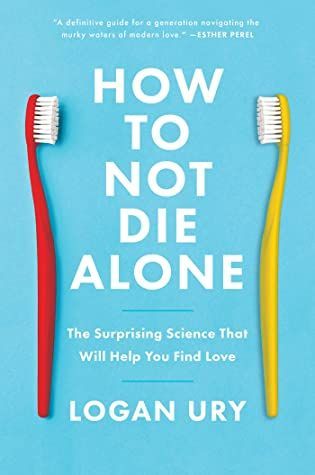
How to Not Die Alone The Surprising Science That Will Help You Find Love
Reviews
First read this book a few years ago when searching for love and the chapter on the spark was the most memorable. Ury argues that it’s important to go on second dates and not mistake the butterflies brought about by anxiety for chemistry/sparks. Perhaps it was the people I was getting to know back then that led me to believe that the spark wasn’t important. After all, I’ve learnt from the book that great relationships are created and not discovered. I remember two guys telling me that they didn’t feel the spark or the urge to pursue something more and I was convinced that I knew something that they didn’t until I met someone I’d call a walking green flag. Despite the conversations that flowed naturally and our beliefs/values which seemed to align, I didn’t feel excited about replying to his texts or meeting him. I’m still trying to figure out if this is because I’m still healing but this experience definitely made me ponder a lot more about the importance of the spark.
Listening to this book a few years later after a heartbreak also provided new insights as I probably didn’t pay much attention to the last few chapters about breakups when I first read it. Here are some quotes from the book that serve as good reminders, especially at times when I feel like I’m never going to get over this:
- Framing is the key to getting over breakups
- See the experience as a gain, something empowering that will improve your life in the long run, instead of a devastating loss
- Overcoming heartbreak is all about perspective
I need to remember that I can build the relationship of my dreams and that the key to making a relationship which lasts is creating one that can evolve. Now that I’m given another chance to choose again, I have to do it wisely. Love might be important, but it’s also imperative that there’s a willingness to work through issues and grow together.
Some tips are definitely worth the try. Online dating is really hard as it is, any help is useful.
Our friend Logan has taken the most important but left-to-chance aspect of our lives — love — and written an extremely actionable guide to getting to what you want, based on clear evidence from behavioral science. Why hasn’t anyone done this before?? I don’t know! How to Not Die Alone can guide you through just about any situation that might be blocking you from realizing a successful long-term partnership, whether you’re at the beginning or end of the road. If you haven’t started dating yet — or if you have, but it’s not working for you — or if you’re with someone and not sure whether/how to break up, or whether/how to move to the next stage, including moving in or getting married — this book can help you make good, intentional decisions at any stage. The advice is practical, memorable, readable, no-nonsense, and backed up by research. I'm recommending this book to everyone I see.
How Not to Die Alone is that rare type of self-help book that manages to be both fun and insightful. When I received my copy in the mail, my roommates and I immediately started taking the quiz to figure out which archetype we were (surprise, we're an apartment full of Maximizers). Moreover, the book is engaging, and Logan's look at the end-to-end lifespan of a relationship is a fresh take that distills many dating-related myths, from "sparks" to texting your ex. And in spite of the data-driven lens of the book, you can tell that this is Logan's turf. Her passion behind studying relationships and helping folks find love is both obvious and inspiring, and as somebody with bragging rights of knowing Logan personally (sorry, couldn't resist ¯\_(ツ)_/¯), I think it's so rad that she's actively studying what excites her and sharing it with the rest of us. (Also, if you haven't already, you should check out Logan's beautiful, poignant essay for Modern Love. )
Highlights
Maybe you loved one person better, maybe you had three important relationships, or maybe you were single and had a life full of excitement. Either way, it was an adventure, not an accident.
You designed your life, you held yourself accountable, you were honest with yourself about who you were and what you wanted, and most important, you course-corrected when you had to. You didn’t live someone else’s idea of life, you lived yours.
The quality of your relationships determines the quality of your life. Relationships are your story, write well, and edit often.
The first opportunity cost is losing the chance to learn.
Great relationships are built, not discovered